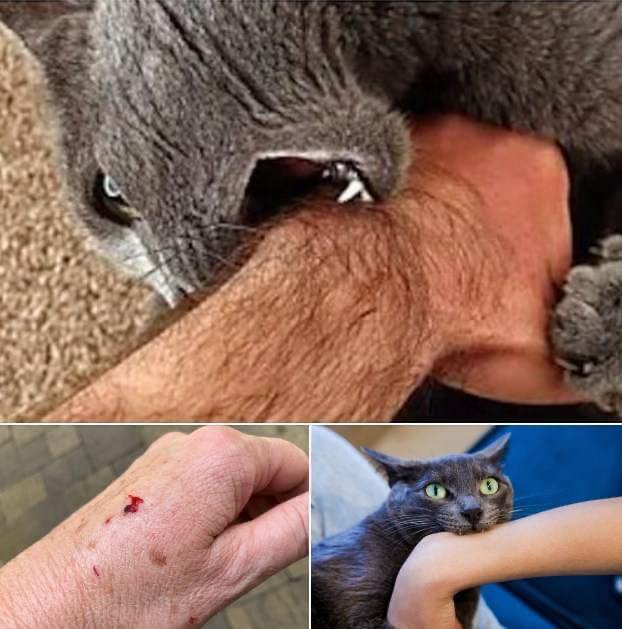If The Cat Bites You …Here’s What It Really Means

Anyone who’s ever had a cat knows just how wonderfully quirky they can be. My old cat loved to play, chase mice, and cuddle with me. But every now and then, he’d give me a little bite—not often, but it always took me by surprise. Does your cat bite you too? If so, here’s what it could mean: When a cat bites you, the meaning can vary depending on the context and the nature of the bite. Here are some common reasons…
Playfulness
Cats are naturally playful creatures and, of course, need space to explore their world. Sometimes, during play, cats will gently bite, especially when they’re overstimulated. These playful nips are usually not aggressive and don’t break the skin, though they can still be surprising and even painful!
Love Bites
If your cat really likes you, it’s not unusual for them to give you a little nibble now and then. It’s just their way of showing affection. Cats may offer soft, gentle bites when they’re purring or enjoying being petted. They might also give a playful nip when they’re hungry, signaling a request for food. These affectionate bites can also be a subtle way for a cat to ask for more attention or, conversely, less affection. Rather than being a sign of aggression, these nibbles are typically how cats express their needs and reinforce their bond with their owners.
Overstimulation
Just like humans, cats can become overwhelmed by too many sensations. When they’re overstimulated from excessive petting or attention, they may give a quick bite to signal that they need some space. It’s their way of saying, “I’ve had enough for now.”
Fear or Stress
This is often the first thing that comes to mind when someone gets bitten by a cat. Biting can be a natural defense mechanism. If a cat feels threatened or scared, they may bite to protect themselves.
Pain or Discomfort
A cat bite can sometimes be a sign that something’s wrong. If a cat bites unexpectedly or seems to snap suddenly, it could be due to pain or illness. A vet check-up can help rule out underlying health issues, ensuring your cat is healthy and comfortable.
Territorial Behavior
Cats are naturally territorial animals, and biting can be a way for them to assert dominance or protect their space. Whether it’s their favorite spot on the couch, a cherished toy, or a specific area they consider their own, a cat might bite to defend what they see as their territory. This behavior typically arises when they feel threatened or insecure, reminding us that, like their wild ancestors, cats have strong instincts to guard their environment.
Young Cats and Kittens
Kittens and young cats are known for their playful, energetic nature. They often engage in rough play, which can include biting their owners’ hands or feet. While this behavior might seem harmless when they’re small, it’s important to recognize that encouraging such play can have long-term consequences.
Kittens learn about their environment and social boundaries through play. If allowed to bite hands or feet in their early months, they may carry this behavior into adulthood. As they grow, their bites become more forceful and painful, potentially causing harm. To prevent this, redirect their playful energy towards appropriate toys and activities. Teaching them that hands and feet are not suitable playthings will help them develop better manners as they mature. By establishing these boundaries early on, you can ensure your cat grows into a well-mannered adult, reducing the risk of injury and fostering positive interactions with your feline friend.
